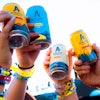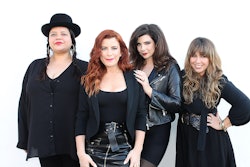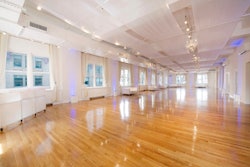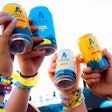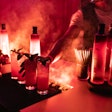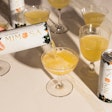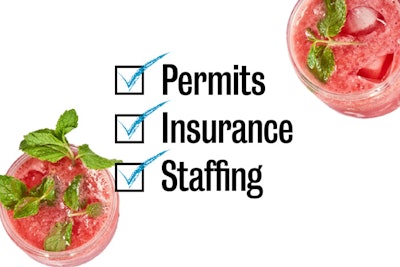
As holiday party planning ramps up, here are essential things to know about permitting, insurance, staffing, getting guests home safely, and more.
Know the local laws.
“Liquor licensing laws vary from state to state and from city to city,” says Becky Geisel, owner of BEX Catering and Events in New Jersey. Some states and counties require documentation of floor plans, a landlord’s signature, and even a menu before granting permits. Many local laws spell out how much advance notice is required when requesting a permit.
Geisel also recommends asking if your caterer carries liquor liability insurance, a non-negotiable item for certain venues. Public spaces like parks and museums in particular often require more coverage than is standard for catering insurance. In such cases, a rider can make up the difference. “It costs me a little bit more, but it ensures that everyone will be covered,” she explains.
Establish accountability.
Establish and communicate who will be accountable for each alcohol-related aspect of an event. “It’s important to identify who has the liquor license, whether it be the venue, the caterer, or another party,” says Kristen Herlihy, vice president of Fort Lauderdale-based Team Enterprises, which handles experiential marketing for Bacardi and MillerCoors. She recommends assigning duties early in the planning process. “Make sure it’s clear to everyone who will be responsible for checking I.D.s either at the door or inside the venue, who will be in charge of monitoring consumption levels during the event, and what the protocol will be for dealing with guests who look like they’ve had too much to drink.”
Safety first.
“Safety is the number-one thing for guests and staff,” notes Mary Cleaver, president of the Manhattan catering firm the Cleaver Company. “You have to think about it and plan for it.” To safeguard guests’ wellbeing, have security and medical personnel on site. If the venue or caterer provides these services, ask about any extra fees as well as their qualifications. If off-duty police officers will be securing the event, think about whether you would like them to wear a uniform or plain clothes. “We hire security to help us extinguish problems quickly without the burden falling on the bartenders,” Geisel says. “We hire secondary security for an event with alcohol, especially if there are underage guests. They are there to protect everybody.”
Have a plan to identify minors.
For events with a mix of underage and adult guests, devise a system to identify who can legally consume alcohol—whether that means carding at the door or at the bar and then giving out wristbands, hand stamps, or another kind of designation. Then communiate it to staff. “I recommend having some sort of visible identification,” says Dise Taylor, event manager at San Francisco’s Inspire Productions.
Offer non-alcoholic beverages.
Not every guest drinks alcohol, so consider their needs when designing a beverage menu and offer choices like mocktails. Doing so helps guests feel included and can prevent overconsumption. In addition, serve water. Whether it’s in an elegant glass decanter or a tasteful array of small bottles, display water prominently to encourage guests to stay hydrated.
Feed the crowd.
To limit excessive intoxication, provide ample food options. “We highly advise against events that serve alcohol but not food,” says Laura Fehrle, general manager at Garces Events in Philadelphia. “We will even go so far as to decline jobs where the client wants to serve alcohol but not make food available.” In fact, some jurisdictions legally require it. Food quantities should reflect both the number and consumption habits of the attendees. “Often food budgets get cut, but from a responsibility standpoint you have to have substantial food if you’re serving alcohol,” says Herlihy.
Hire qualified and educated bar staff.
Several resources exist to train staff to serve responsibly. Services like TIPS (Training for Intervention Procedures) and RAMP (Responsible Alcohol Management Program) offer certifications that educate bartenders and servers about how to properly monitor alcohol consumption. “TIPS trains staff on how to recognize when people are drinking too much and what to do when there’s a problem,” says Geisel. A properly trained team instills confidence and enables staff to better identify and diffuse potentially disruptive situations.
Timing is everything.
To prevent bottlenecks at the bar, discuss arrival flow with the catering staff. If guests arrive en masse by shuttle, greet them with trays of wine, water, and a signature cocktail to prevent a rush on the bar. “Accounting for the way guests are arriving helps alleviate the stress on the bartenders so that the line is manageable,” says Michael Stavros, director of business development at M Culinary Concepts in Phoenix.
Timing guidelines for an open bar should also be considered and communicated to both staff and guests. And be sure to identify who, if anyone, has the authority to extend bar service hours when the event is already underway.
Offer a ride home.
For events that involve alcohol, planners can work with local taxi companies or car services like Lyft and Uber to make it easy for guests to get home safely. Uber and Lyft both offer promo code options that bill the costs to the event organizer rather than the guest. For events in areas where ride apps are less common, Geisel recommends arranging for shuttle and limousine service from local operators. If you alert local taxi companies about the event ahead of time, they can plan to make more drivers available.
